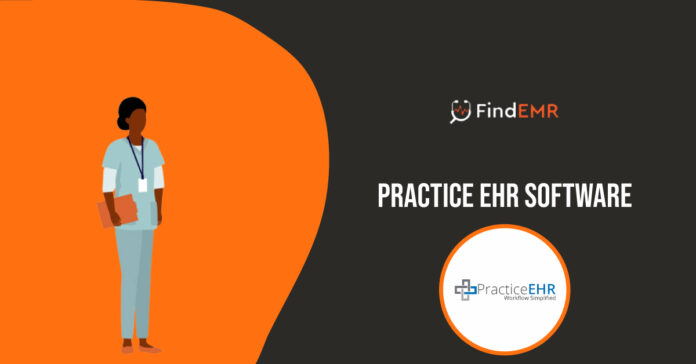Practice EHR Software
Practice EHR Software offers specialty-specific EHR, PM, and revenue cycle management services. These solutions streamline practice management and billing. They also offer specialty-specific workflow. They can help you get more patients and improve your business by automating a number of processes. In addition, these solutions are easy to use and flexible.
Cloud-based
If you’re considering an EHR system for your practice, the cloud-based approach may be the way to go. Cloud-based systems are managed by a SAAS provider that handles the maintenance and updates automatically. These systems also ensure compliance with federal security guidelines. In addition, they provide the flexibility to scale with your practice.
A cloud-based EHR system allows you to access patient records from any device with an internet connection. This means that even if one of your servers crashes, your patients’ records will remain stored. Another benefit of cloud-based practice EHR software is that it eliminates the IT growing pains associated with on-premises EHR systems. As you grow, you can add users and expand your practice without having to invest in new hardware and software.
Easy to use
An easy-to-use practice EHR software can streamline the day-to-day activities of a doctor’s office. These programs are customizable to accommodate multiple specialties, including family medicine, podiatry, and chiropractic practices. They can also handle a variety of health insurance requirements, including claims processing, denials, appeals, and follow-ups.
Practice EHR software can simplify the process of completing a patient chart with customizable specialty templates. They also feature a voice-recognition system, which makes chart completion even faster and easier. Additionally, they support electronic prescribing and are Surescripts certified, enabling physicians to electronically submit prescriptions to over 68,000 pharmacies nationwide. Lastly, easy-to-use practice EHR software can handle many of the administrative tasks of a medical practice, including billing and scheduling.
Flexible
Flexible practice EHR software is a great solution for a variety of medical practices. Many vendors offer free trials. However, smaller practices are likely to pay a monthly fee that’s multiplied by the number of providers. It is important to consider the cost of this software when making the decision.
Intergy is a leading provider of EHR software for physicians. It was named a Best EMR for Acute Care in 2018 by KLAS. It also scored high marks for its ambulatory RCM services. It is best suited for large practices with multiple locations and for accountable organizations, advanced surgical centers, tribal health facilities, and independent practice associations.
Robust
A robust practice EHR software solution can be very valuable in a variety of ways. In addition to storing patient information, it offers features such as a native lab management database and pharmacy management system that enable users to directly upload lab results and manage patient information. It may also have voice recognition capabilities that can reduce errors related to charting. It can even offer mobile apps that help you stay in touch with your patients. Finally, a robust practice EHR software solution can be flexible and adaptable to meet the specific needs of a practice.
An EHR software system can improve patient care, simplify the practice workflow, and help the practice reduce costs. These software systems can also provide robust reporting and analytics. Other features include E-Prescribing, which improves patient safety, and Electronic Eligibility Verification, which enables physicians to verify patient coverage in real time.
Reporting
Practice EHR software offers comprehensive reporting capabilities for a variety of practice management purposes. Reports can help you keep track of key practice metrics, monitor billings and collections, and identify data entry errors and missed revenue opportunities. They can also help you understand the patient flow in your practice. The right software can also help you create custom reports tailored to your practice’s needs.
Reporting with practice EHR software allows physicians to stay on top of their patient’s health and make informed decisions. It can help improve patient care by helping physicians provide preventative care or chronic care management. In addition, reporting can help identify patients who haven’t filled out their medical documentation, which can improve coordination and safety. Previously, physicians would have to spend time reviewing patient files manually. Now, using practice EHR software, doctors can run reports to quickly determine if information is missing from their patient’s files.
Clinical decision support
Using clinical decision support (CDS) in practice EHR software is a powerful way to improve efficiency, improve patient care, and lower costs. It clinical judgments and enables care team members to make informed, timely decisions. Clinical decision support (CDS) is also an important component of Meaningful Use. The CMS provides a useful document for clinicians looking to implement CDS in practice. For more information, visit the CMS’s website.
Clinical decision support (CDS) is a technology that provides clinical knowledge to clinicians, allowing them to make informed decisions in a matter of seconds. It does this by providing context-specific information and alerts for predetermined orders or diagnostic and therapeutic bundles. It may also be used to enhance clinical workflow. Examples of CDS include computerized reminders and alerts, condition-specific order sets, documentation templates, and contextual reference information.
Lab integration
In a practice where the lab is a key component, lab integration in practice EHR software makes that process seamless and streamlined. It helps doctors focus more on patient care by improving operational and treatment outcomes. In addition, it saves time. Typically, labs use separate interfaces, which complicates the process.
Thankfully, lab integration in practice EHR software can eliminate most of these problems. The most advanced systems are bi-directional, so patients can access results as soon as they are ready. Additionally, bi-directional connectivity reduces errors that can occur from manual data entry. Physicians who manually enter information will have a greater risk of making mistakes in demographic data, billing information, and other information. Furthermore, they could end up retyping the same information several times, which could lead to typos, omitted fields, or duplicate data.
Related Resources:

















